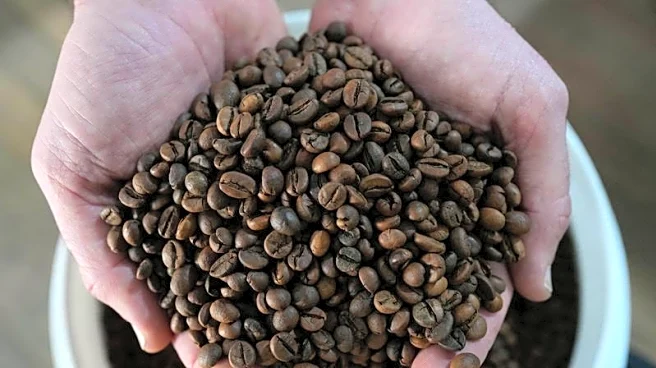What's Happening?
HanchorBio Inc. has announced the publication of its novel CD47-SIRPα therapeutic, HCB101, in the Journal of Hematology & Oncology. The therapeutic, an engineered SIRPα-Fc fusion protein, has shown promising
preclinical efficacy for hematological and solid tumors. HCB101 demonstrated a nearly 90% partial response rate in combination therapy for 2L gastric cancer and safe escalation to 30 mg/kg in monotherapy. The publication highlights HCB101's ability to restore macrophage-mediated phagocytosis and bridge innate and adaptive immune responses while minimizing red blood cell binding. This development marks a significant milestone for HanchorBio, emphasizing the therapeutic's potential as a backbone immunotherapy across various cancer types.
Why It's Important?
The publication of HCB101 in a prestigious journal underscores its potential impact on cancer treatment, offering a differentiated mechanism with high safety and efficacy. This recognition validates HanchorBio's approach to developing next-generation immunotherapies, which could lead to improved outcomes for patients with hematological and solid tumors. The therapeutic's ability to minimize hematologic toxicities while enhancing immune activation positions it as a promising candidate for combination therapies and new applications beyond oncology, such as autoimmune diseases. The advancement of HCB101 could influence the biotechnology industry by setting new standards for safety and efficacy in cancer therapeutics.
What's Next?
HanchorBio plans to continue evaluating HCB101 in multinational Phase 1 and Phase 1b/2a trials, focusing on both monotherapy and combination regimens. The company aims to expand the therapeutic's application to autoimmune indications, leveraging its differentiated mechanism. As clinical trials progress, HanchorBio will likely seek partnerships or collaborations to enhance the development and commercialization of HCB101. The ongoing research and potential expansion into new therapeutic areas could lead to significant advancements in immunotherapy, offering hope for patients with various malignancies.
Beyond the Headlines
The success of HCB101 highlights the importance of innovative protein engineering in developing effective cancer treatments. The therapeutic's publication in a leading journal reflects the growing recognition of CD47-SIRPα pathway targeting as a viable strategy in immuno-oncology. This development may encourage further research into similar mechanisms, potentially leading to breakthroughs in cancer and autoimmune disease therapies. The focus on reducing red blood cell binding while enhancing immune responses could pave the way for safer and more effective treatments, addressing unmet medical needs in the field.











